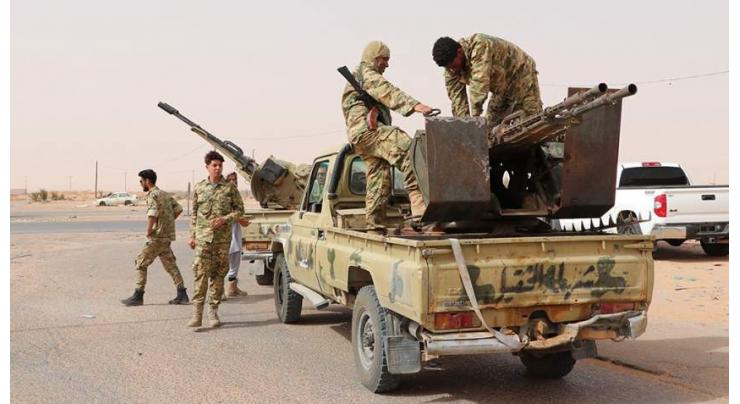
Libya In Chaos Since Overthrow Of Kadhafi
Umer Jamshaid Published August 22, 2020 | 12:02 AM

Oil-rich Libya, where the warring governments have separately announced a ceasefire and nationwide elections, has been mired in chaos since the 2011 ouster and killing of dictator Moamer Kadhafi
Tripoli, (APP - UrduPoint / Pakistan Point News - 21st Aug, 2020 ):Oil-rich Libya, where the warring governments have separately announced a ceasefire and nationwide elections, has been mired in chaos since the 2011 ouster and killing of dictator Moamer Kadhafi.
The country's internationally recognised unity government is based in Tripoli while eastern strongman Khalifa Haftar supports a parallel administration based in the east. A myriad of militias is also vying for control.
Here is a timeline of the Mediterranean country's descent into turmoil.
- Kadhafi killed - Triggered by uprisings in Tunisia and Egypt, demonstrations erupt in Libya in February 2011. A coalition led by Washington, Paris and London lends its backing to an armed revolt.
Kadhafi, in power for 42 years, flees the capital but is captured and killed on October 20, 2011.
Three days later, the rebel National Transitional Council (NTC) declares Libya's "total liberation".
In August 2012 the NTC hands power to a transitional authority, the General National Congress (GNC).
- Embassies targeted - US ambassador Chris Stevens and three American staff are killed in a September 11, 2012 attack on their consulate in Libya's second city Benghazi. An Al-Qaeda-linked jihadist group is blamed.
A car bomb in April 2013 targets France's embassy in Tripoli, wounding two French guards.
Most foreign delegations withdraw.
- Rival governments - Dissident army general Haftar launches an offensive in May 2014 against jihadist groups in Benghazi.
Several military officers from the east join his self-styled Libyan National Army.
As nationalists and Islamists vie for power, legislative polls are held in June and a parliament is elected, dominated by anti-Islamists.
But Islamist-led militias contest the results and storm Tripoli in August, restoring the GNC to power.
The elected house, which has international recognition, takes refuge in the eastern city of Tobruk.
Thus the country finds itself with two governments and two parliaments.
After months of negotiations and international pressure, lawmakers from the rival parliaments sign an accord in December 2015 to set up a Government of National Accord (GNA) which is recognised by the UN.
In March 2016 GNA chief Fayez al-Sarraj arrives in Tripoli to set up the new government. Haftar's rival administration refuses to recognise its authority.
- Haftar's offensives - In July 2017, Haftar announces the "total liberation" of Benghazi from jihadists, after more than three years of fighting.
He is backed by neighbouring Egypt and the United Arab Emirates, later forming links with Russia.
In January 2019, Haftar launches an offensive into oil-rich southern Libya.
His forces seize the region's capital Sebha and one of the country's main oil fields.
On April 4, Haftar orders his troops to advance on Tripoli.
- Foreign involvement - Russia is reported by tne New York Times in November to have sent mercenaries to help Haftar A UN report in December accuses several countries of breaching a 2011 arms embargo by supplying both camps.
In January 2020, Turkey announces the deployment of troops to Libya to help the Tripoli government, opening the way to a series of breakthroughs for the GNA.
- Government takes back control - In early June government forces say they have overrun Haftar's last western stronghold Tarhuna, launchpad of the abortive assault on Tripoli.
They then launch an operation to retake Sirte, a strategic crossroads between the east and west of the country.
On June 2020, Egyptian President Abdel Fattah al-Sisi threatens a "direct" intervention if the government forces advance on Sirte which he describes as a "red line".
On August 21, the rival governments announce in separate statements that they will cease all hostilities and organise nationwide elections soon, an understanding swiftly welcomed by the United Nations and Sisi.
Related Topics
Recent Stories

Army committed to dismantle terrorist groups, ensure protection of people: DG IS ..

"The New realme Note 50 Breaks Sales Records for The Month of April”

Vivo Y100 is Now Available in Pakistan with Color Changing Design & 80W FlashCha ..

Zero-tolerance policy to continue against overbilling: Mohsin Naqvi

Govt working to extend retirement age to 65 years: Finance Minister

Synergy Group wins big at the Effie Awards 2024

ICC Champions Trophy 2025: Indian board makes important statement

Currency Rate In Pakistan - Dollar, Euro, Pound, Riyal Rates On 7 May 2024

Today Gold Rate in Pakistan 07 May 2024

Sharjah Animation Conference explores cross-cultural collaboration opportunities ..

Sharjah Public Library provides countless opportunities for young imaginations t ..

Sharjah Police launches 'Your belongings, your responsibility' awareness campaig ..
More Stories From World
-
Ukraine says thwarted Russian-led plot to kill Zelensky
5 minutes ago -
S.Africa rescuers say in contact with 11 people in collapsed building
5 minutes ago -
Israel sends tanks into Rafah and seizes key crossing
35 minutes ago -
Italy regional president, ex-port boss arrested for graft
45 minutes ago -
Putin, launching fifth term, promises Russians victory
1 hour ago -
Rescuers search for survivors in deadly S.Africa building collapse
1 hour ago
-
'Together we will win': Putin tells Russians at inauguration
2 hours ago -
Cricket: Bangladesh vs Zimbabwe second T20 scores
2 hours ago -
Ambassador Hashmi visits CATIC headquarters, meets Chairman Liu Yu
2 hours ago -
Malaysia acid-attack footballer in 'critical but stable' condition
2 hours ago -
Claims of chemical weapon use in Ukraine 'insufficiently substantiated': watchdog
2 hours ago -
Huge crowds in Vietnam for anniversary of Dien Bien Phu victory over France
2 hours ago